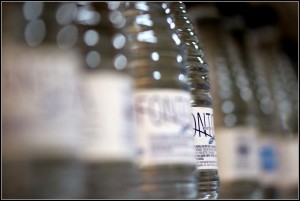Banning the sale and use of plastic water bottles

Water bottles have come under scrutiny on some college campuses. Photo courtesy Photopin
By Karissa Vetch
Many colleges across the country are choosing to ban or reduce the use of plastic water bottles because of their environmental effects. Should Waldorf College be next?
Big and small colleges across the country are choosing to increase their recycling initiative or have banned water bottles all together. Many students have started a petition to ban the plastic water bottles on their campuses. No sale of plastic water bottles in vending machines or campus dining options, but instead are encouraging reusable water bottles to be filled by water fountains. Assuming the ban would then decrease the use and waste of plastic.
According to a 2001 report of the World Wide Fund for Nature (WWF), roughly 1.5 million tons of plastic are expended in the bottling of 89 billion liters of water each year.
Plastic water bottles can be recycled, but depending on the school there may be a lack of recycling stations, or students choosing not to recycle at all. Selling plastic water bottles on campus can still result in students choosing water over other sugary drinks.
“Waldorf’s first step should be to increase our recycling tactics before banning plastic water bottles all together,” said Abbie Wells a junior at Waldorf College. “There should be more recycling stations on campus and in campus housing first.”
Rachel Johnson, A nutrition professor at the University of Vermont tracked what the ban actually did for students and for the environment after the University placed the ban. Her work was published in the July issue of American Journal of Public Health.
“Not only did campus consumers not purchase fewer bottled drinks, but the loss of bottle water meant they consumed more unhealthy sugary drinks as well,” Johnson said in an interview. “Total calories from beverages rose by over 20 percent on a per capita basis. The share of healthy beverages sold on campus dropped by more than half.”
David Damm a communications professor at Waldorf College said, “I don’t think we should ban plastic water bottles. I think we should recycle more and encourage students to fill up reusable water bottles. If we ban the sale of plastic water bottles we should also ban the sale of sugary drinks in plastic water bottles.”
There are environmental positives to banning the sale of plastic water bottles but how big are the unintended consequences?
